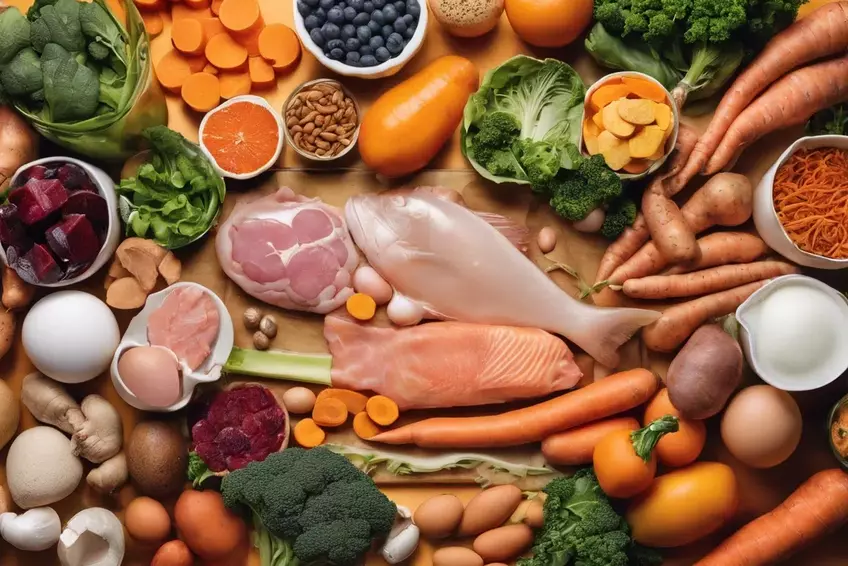The Essential Role of Vitamin A: Benefits, Sources, and Importance in Health
Vitamin A is a crucial nutrient that plays a significant role in maintaining various bodily functions. From supporting vision to enhancing immune response, its benefits are vast and varied. In this article, we will explore the importance of vitamin A, focusing on its impact on prenatal development, hair health, and the foods that are rich in this essential vitamin.
Understanding Vitamin A
Vitamin A is a fat-soluble vitamin that exists in two primary forms: preformed vitamin A (retinol) found in animal products and provitamin A carotenoids found in plant-based foods. This nutrient is vital for many physiological functions, including vision, immune function, skin health, and reproduction.
The Role of Vitamin A in Prenatal Development
One of the critical periods in which vitamin A plays a significant role is during pregnancy. Adequate levels of vitamin A in prenatal development are crucial for fetal growth and development. This vitamin helps in the formation of the heart, lungs, kidneys, and other organs. It also plays a pivotal role in the development of the immune system, ensuring that the fetus is equipped to fight off infections after birth.
Research has shown that vitamin A deficiency during pregnancy can lead to severe consequences, including fetal malformations and complications during delivery. Therefore, maintaining appropriate vitamin A levels is vital for the health of both the mother and the baby. Pregnant women are often advised to consume foods high in vitamin A or take supplements if necessary, but they should be cautious about not exceeding recommended levels, as excessive vitamin A can also be harmful.
Foods High in Vitamin A
To ensure an adequate intake of vitamin A, it’s essential to incorporate foods high in vitamin A into your diet. Here are some of the best sources:
- Liver: Beef and chicken liver are among the richest sources of preformed vitamin A. Just a small portion can meet or exceed the daily requirements.
- Fish: Certain fish, such as salmon and mackerel, also provide significant amounts of vitamin A.
- Dairy Products: Whole milk, cheese, and butter are good sources of retinol, making them beneficial for maintaining healthy vitamin A levels.
- Eggs: Eggs are not only a good source of protein but also provide a decent amount of vitamin A.
- Carrots: Known for their high beta-carotene content, carrots are a fantastic plant-based source of vitamin A.
- Sweet Potatoes: These are another excellent source of beta-carotene, which the body converts into vitamin A.
- Spinach and Kale: Leafy greens are rich in carotenoids, making them essential for a vitamin A-rich diet.
- Orange and Yellow Fruits: Mangoes, apricots, and cantaloupes are also high in beta-carotene.
By incorporating a variety of these foods into your diet, you can ensure you’re getting enough vitamin A to support your overall health.
Vitamin A for Hair Growth
In addition to its many health benefits, vitamin A is often highlighted for its role in promoting hair health. It contributes to the production of sebum, an oily substance that moisturizes the scalp. This natural oil is essential for keeping hair healthy and preventing dryness and breakage.
How Vitamin A Supports Hair Health
- Sebum Production: As mentioned, vitamin A is vital for the production of sebum. A healthy scalp creates an optimal environment for hair follicles to thrive, reducing the chances of hair loss.
- Cell Growth: Vitamin A promotes cell growth, which is essential for the regeneration of hair cells. This is crucial for maintaining a full and vibrant head of hair.
- Prevention of Hair Loss: A deficiency in vitamin A can lead to hair loss, as the body cannot produce enough sebum or maintain the health of hair follicles. Ensuring adequate intake can help mitigate this risk.
Sources of Vitamin A for Hair Care
To harness the benefits of vitamin A for hair growth, consider including the following vitamin A foods in your diet:
- Carrots: Their high beta-carotene content is beneficial for promoting hair health.
- Sweet Potatoes: Another excellent source, sweet potatoes can be easily incorporated into meals.
- Leafy Greens: Spinach and kale are not only good for overall health but also for hair vitality.
- Eggs: With both vitamin A and protein, eggs are a great addition to your diet for healthy hair.
The Balance of Vitamin A Intake
While vitamin A is essential, it’s important to maintain a balance. Too little can lead to deficiencies, while too much can cause toxicity. Symptoms of vitamin A toxicity may include dizziness, nausea, headaches, and even more severe health issues. Pregnant women should be particularly cautious, as excessive vitamin A can cause birth defects.
Conclusion
Vitamin A is undeniably a vital nutrient that supports various aspects of health, from prenatal development to hair growth. Including foods high in vitamin A in your diet ensures you receive the necessary benefits this vitamin offers. Whether through animal sources like liver and dairy or plant-based options like carrots and sweet potatoes, making informed dietary choices can help you maintain optimal vitamin A levels.
In summary, vitamin A is a powerhouse nutrient with extensive benefits for overall health. By understanding its significance and sources, individuals can better manage their intake to promote a healthy lifestyle. Prioritize vitamin A in your diet, and you may find improvements not just in your health but also in the health of your hair and skin.

